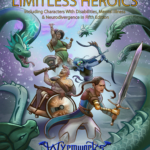Tongue Louse

- Armor Class 10
- Hit Points 1
- Speed 10 ft., burrow 10 ft., climb 10 ft., swim 10 ft.
| STR | DEX | CON | INT | WIS | CHA |
| 1 (-5) | 10 (+0) | 1 (-5) | 1 (-5) | 7 (-2) | 1 (-5) |
- Skills Stealth +2
- Senses darkvision 30 ft., passive Perception 8
- Languages —
- Challenge 0 (10 XP)
Actions
Tongue Bite. The louse crawls into the mouth of an unconscious humanoid on a successful Dexterity (Stealth) check with advantage against the target's passive Wisdom (Perception). It then secretes a poison which numbs the mouth on a failed DC 10 Constitution save. The numbing takes 1 minute to take effect, at which point the louse begins to consume the tongue by swallowing it whole and digesting it with acid, which takes 1 hour. If anyone notices the louse before the end of this process, it can be removed with a successful contested Strength check. If the discovery was made within the first 9 minutes of consumption, the target will be unable to speak until after a long rest but will experience no ill effects beyond that. If the discovery is made 10–60 minutes after consumption, the target will permanently experience the effects of Minimal Tongue with an IE equal to the number of minutes ÷ 20 rounding up.
If the louse is removed after 10 minutes, a DC 10 Wisdom (Medicine) check will be needed to stop the bleeding, or the target will lose 1 hp per round until dead.
At the end of the hour, the louse has attached itself to the nervous system through the nerves in the mouth, and any attempt to remove it short of a Greater Restoration or Wish spell will kill the host.
Once attached, the louse responds to neural commands and acts like a tongue with a Speech Impediment (difficulty pronouncing labial sounds due to trying to hide the louse, but you must succeed on a Charisma (Performance) check against the passive perception of anyone they talk to within 10 feet to conceal it or experience disadvantage on all Charisma checks with those aware of the louse.
A tongue louse lays 10 eggs every week along with a foul-tasting liquid, prompting the host to want to spit it out. These eggs will hatch in 7 days and begin to seek hosts.
